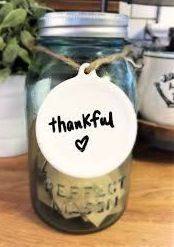Thankfulness Jar

I love this idea and posted it a couple of years ago and thought we could all use it again. With all the ugly things going on in this world we can always find something to be thankful for, so let’s write those things down and put them in a jar! Then when you are feeling low, or down and out you can go back to that jar and take a couple of them out, read them and you will feel so much better. What better time to do this than Thanksgiving time?
The Oxford Dictionary states that being ‘thankful’, is being ‘pleased and relieved’. It is a feeling. A warm and pleasing state of mind. Feeling gratitude is an action, like saying, ‘thank you’. It is something we have been conditioned into saying from the moment we learn to talk. It is an automatic response. However, this “automatic” response has been lacking by so many these days. We need to get back to using our manners and saying please and thank you to others.
A thankfulness jar can be made at home, in school, or in an assisted living community. It doesn’t require many tools and the benefits will be plentiful.
First, you will need a jar of any size, some slips of paper, ribbon, a sharpie, fabric, wrapping paper (or whatever you’d like to decorate your jar with), and a pen.
The process is so simple, you decorate your jar and write on the slips of paper what you are thankful for and put them in the jar. Whenever you are feeling blue, or the bad things happening in this world are getting you down, you can go back to your jar and read the slips of paper.
Some of the benefits of a thankfulness jar are:
- Gratitude opens the door to more relationships.
- Gratitude improves physical health.
- Gratitude improves psychological health.
- Gratitude enhances empathy and reduces aggression.
- Grateful people sleep better.
- Gratitude improves self-esteem.
- Gratitude increases mental strength.
It’s a no-lose project and you may even have some fun creating your jar.
If you are making your thankfulness jar for only a short period of time, why not write a slip every day and pop it in the jar. If you are doing your jar for a longer period, why not write out a slip at the end of the week. Perhaps make it a family event, where you all take a moment together and sit quietly to write on separate pieces of paper. When the time comes at the end of your thankfulness jar period, open the jar, pour them all out and read them. See which ones are your favorites, or which ones have been said more than once.
If you are up for a challenge, why not start one this Thanksgiving and do it for a whole year? Every couple of weeks write a note out. Then in a year’s time, when you are all together around the table, pour them all out. Reminisce, laugh, cry and be happy together.
If you can’t come up with anything to write, here are some quotes that may help stimulate your imagination or at least give you something to think about.
“If a fellow isn't thankful for what he’s got, he isn't likely to be thankful for what he's going to get.”
—Frank A. Clark
“When you arise in the morning give thanks for the food and for the joy of living. If you see no reason for giving thanks, the fault lies only in yourself.”
—Tecumseh
“When you are grateful, fear disappears, and abundance appears.”
—Anthony Robbins
“Strive to find things to be thankful for, and just look for the good in who you are.”
—Bethany Hamilton
“I have a lot to be thankful for. I am healthy, happy and I am loved.”
—Reba McEntire
“When eating fruit, remember the one who planted the tree.”
—Vietnamese Proverb
“He is a wise man who does not grieve for the things which he has not but rejoices for those which he has.”
—Epictetus
“The deepest craving of human nature is the need to be appreciated.”
—William James
Assisted Living Made Simple hopes you have many things to be thankful and grateful for this holiday season and all year long. Should you decide to make a thankfulness jar, please call us at 386-847-2322 and tell us how it went or post a picture of it to our Facebook page, we’d love to see your photos.



